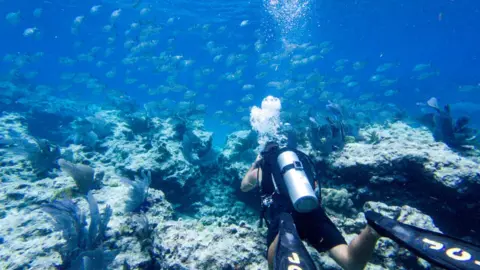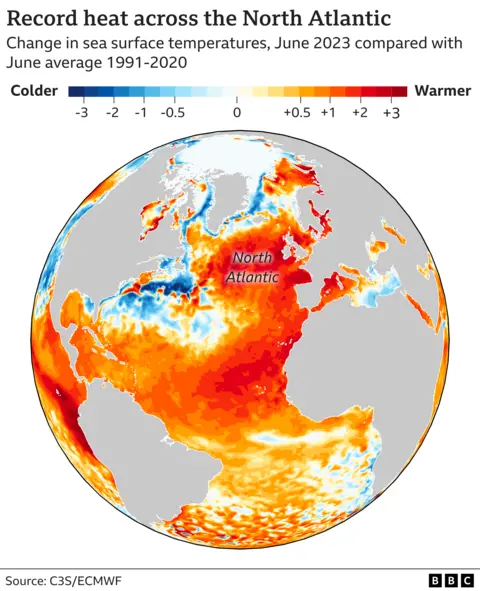Seawater temperatures in Florida at hot tub levels, experts warn
 Getty Images
Getty ImagesSeawater along the tip of Florida has exceeded hot tub temperatures of 37.8C (100F) in recent days, making it potentially the hottest ever measured.
A buoy in Manatee Bay registered triple-digit readings on Sunday and Monday, while buoys in two other places also nearly reached that mark.
The highest ocean surface temperature ever recorded, albeit unofficially, was 37.6C (99.7F) in Kuwait Bay in 2020.
The warming waters threaten marine life and ocean ecosystems like coral reefs.
Scientists have observed bleaching and even death in some of the Florida Keys' most resilient reefs, home to millions of algae and other tiny organisms.
Bleaching is when corals expel algae, lose their vibrant colour and weaken as water temperatures exceed roughly 35C. Such events can lead to death.
"The corals are pale, it looks like the colour's draining out," said Katey Lesneski, a research and monitoring coordinator with the National Oceanic and Atmospheric Administration (NOAA).
"And some individuals are stark white. And we still have more to come."
Peak bleaching typically happens in late August or September, but experts say it is taking place much sooner than expected this year as the water temperatures spike.
NOAA this week raised its coral bleaching warning system in the Keys to Alert Level 2, its highest heat stress level.
"This is a hot tub. I like my hot tub around 100, 101, (37.8C, 38.3C) That's what was recorded yesterday," Yale Climate Connections meteorologist Jeff Masters told Associated News.
Hot tub makers recommend temperatures of 37C-40C (98F-104F).
Surface temperatures in Manatee Bay, as well as nearby Murray Key and Johnson Key, have gone down since their Monday peak, but remain elevated in the high 80s.
Waters as warm as those currently in Florida pose a threat to fishermen and others whose livelihoods may be tied to the water, with knock-on effects for human food supply.
One fishing boat captain in Key Largo told the Guardian his catch has been getting "slower and slower" over the past five summers.
Ocean surface temperatures worldwide have broken heat records for the months of April, May and June, according to the US government agency.

